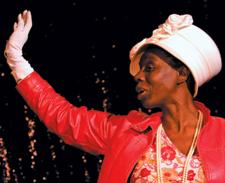“I wanted to create a characterthat on one level could be seen as absurd, but on another level could be plausible,” says queer Edmonton and Vancouver–based writer/performer Valerie Mason-John of Queenie, the protagonist of her one-woman piece Brown Girl in the Ring.
Bedecked in classic Queen Elizabeth II morning suit, hat and gloves, Mason-John has regaled many an incredulous audience with her energetic 50-minute romp as the black Queen of England.
“The premise of the show is telling the story of how I came to be Queen of England,” says Mason-John, based on a historical finding that the grandmother of Queen Victoria was [the] half-African, half-German Sophie Charlotte, queen consort of King George III.
“Not many people know about that,” she says. “A lot of people in Canada aren’t aware of it. They are shocked, really, and I’ve told people, ‘Go and Google it, I’m not lying.’”
It’s an element Mason-John takes poetic licence with as she unveils the tragicomic psychology that informs Queenie’s sense of self: has this woman lost it, basically, or, in discovering her truth, does she lose it?
It’s a damning yet entertaining deconstruction of the deep and still prevalent reach of Eurocentrism.
“I’m looking at what it’s like for black or immigrant people to grow up in a predominantly white society and how that can really affect them, how that can make them feel like they’re white, or feel like they want to be white,” she explains.
“I play with that [children’s song] “Brown Girl in the Ring” — it’s like you’re the fly in the milk, always looking like the odd person out.”
On a more intimate, familial level, it’s also an indictment of secrets, the taboos that are swept under the family carpet, she adds.
“What’s interesting is it’s about being a throwback; I’ve known people who’ve been in that situation — white family and they come out dark.”
The message of the piece is for people to be curious about their own family lineages, Mason-John says.
“There are many Canadians who have First Nations blood in them [and] they don’t find out until they’re like 40, and then they’re shocked because their family has hidden it.
“This is what the piece is about: how families want to hide that black blood, being First Nations, or whatever. And it’s to take pride in that,” Mason-John concludes.


 Why you can trust Xtra
Why you can trust Xtra


